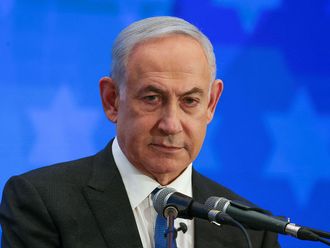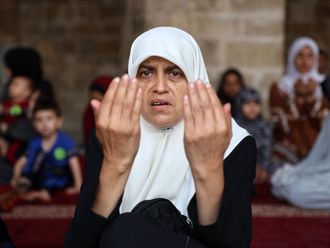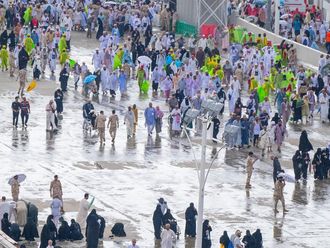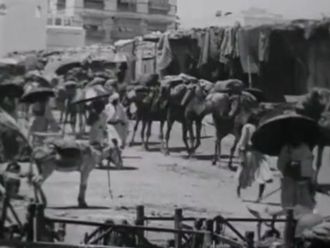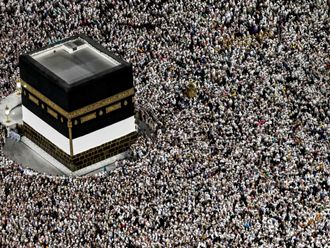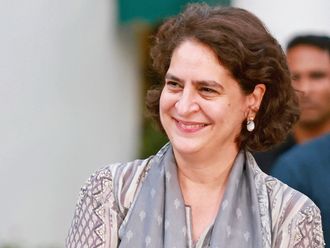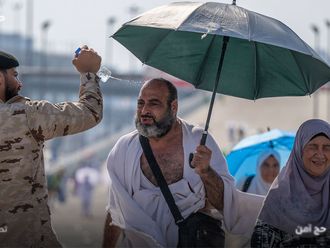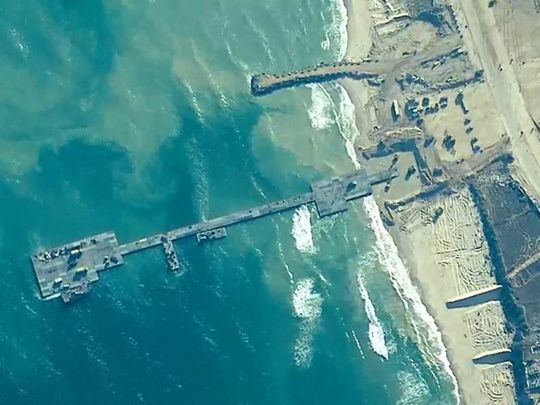
Rafah: The first trucks began supplying aid to the war-ravaged Gaza Strip via a temporary pier on Friday, the US military said, as fighting raged in the Palestinian territory.
With Gazans facing hunger, the US military said “trucks carrying humanitarian assistance began moving ashore” via the long-awaited pier which the US Central Command, or CENTCOM, said was anchored to a Gaza beach on Thursday.
“This is an ongoing, multinational effort to deliver additional aid to Palestinian civilians in Gaza via a maritime corridor that is entirely humanitarian in nature,” it said.
CENTCOM issued pictures showing aid being lifted onto a barge in the nearby Israeli port of Ashdod, adding on social media platform X that no American troops went ashore.
The US military has said in the coming days around 500 tonnes of aid is expected to enter Gaza, where the United Nations has warned of a looming famine.
The aid is being shipped out of Cyprus, the European Union’s easternmost member around 360 kilometres from Gaza.
The latest shipment was carrying EU supplies, the 27-member bloc said, including 88,000 cans of food from Romania.
Fierce battles
The European Union welcomed the shipment but called on Israel to “expand deliveries by land and to immediately open additional crossings”.
“It is evident that there is no meaningful substitute to land routes via Egypt and Jordan and entry points from Israel into Gaza for aid delivery at scale,” said EU crisis management commissioner Janez Lenarcic.
The United Nations has also said the maritime aid corridor, and ongoing airdrops from planes, cannot replace far more efficient overland truck deliveries.
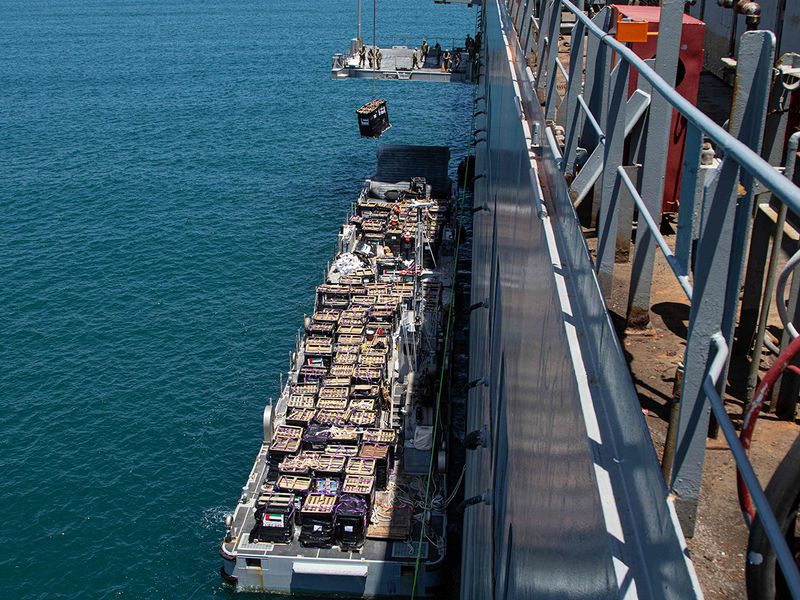
US President Joe Biden had announced the plan to construct the pier in March, as Israel held up deliveries of aid on the ground, worsening Gaza’s dire humanitarian situation.
News of the delivery came as witnesses reported fierce battles overnight Thursday-Friday in and around the Jabalia refugee camp in north Gaza.
Israeli helicopters carried out heavy strikes around Jabalia while army artillery hit homes near Kamal Adwan hospital in the camp, they said.
The bodies of six people were retrieved and several wounded people were evacuated after an air strike targeted a house in Jabalia, Gaza’s Civil Defence agency said.
Rescue teams were trying to recover people from under the rubble of the Shaaban family home on Al Faluja Street in the camp, it added.
Witnesses said Israeli warships launched strikes on Rafah, where more than 1.4 million Palestinian civilians have been sheltering.
Hamas’s armed wing, the Ezzedine Al Qassam Brigades, said it “targeted enemy forces stationed inside the Rafah border crossing... with mortar shells”.
Rafah offensive
The war erupted after the October 7 attack on Israel which resulted in the deaths of more than 1,170 people, mostly civilians, according to an AFP tally based on Israeli official figures.
Out of 252 people taken hostage that day, 128 are still being held inside Gaza, including 38 who the army says are dead.
Israel vowed in response to crush Hamas and launched a military offensive on Gaza, where at least 35,303 people have been killed since the war began, according to data provided by the health ministry of Hamas-run territory.
Israel has vowed to “intensify” its ground offensive in Rafah, in defiance of global warnings over the fate of those sheltering there.
Israel’s top ally the United States has joined other major powers in appealing for it to hold back from a full ground offensive in Rafah.
But Israeli Defence Minister Yoav Gallant on Thursday said “additional forces will enter” the Rafah area and “this activity will intensify”.
On the same day, Prime Minister Benjamin Netanyahu insisted Israel’s ground assault on Rafah was a “critical” part of its army’s mission to destroy Hamas and prevent any repetition of the October 7 attack.
Many of those fleeing Rafah have headed for the coastal area of Al Mawasi that Israel has declared a “humanitarian zone”.
Satellite images also show a vast new tent city that has sprung up near the main southern city of Khan Yunis.
Many of the displaced are “exhausted, they are scared, they don’t have resources”, said Javed Ali, head of emergency response in Gaza for International Medical Corps.
Arab call for peacekeepers
On the diplomatic front, the Arab League issued a call on Thursday for “international protection and peacekeeping forces of the United Nations” to be deployed in Palestinian territories.
In a statement at the end of a summit in Bahrain, the 22-member bloc also appealed for an “immediate” ceasefire in Gaza and an end to forced displacement in the narrow coastal territory.
The United States said a UN peacekeeping force could compromise Israel’s efforts to defeat Hamas, while stopping short of opposing it.
“Candidly, the addition of additional security forces could potentially put that mission into compromise,” said State Department spokesman Vedant Patel.
But he said the United States did not yet have a “conclusive assessment” of the summit’s statement and suggested a force could be more acceptable once a ceasefire is in place.
Despite previous threats by Biden to withhold some arms deliveries over the Rafah offensive, his administration informed Congress this week of a new $1 billion weapons package for Israel, sources told AFP.
At the United Nations’ top court in The Hague, Israel hit back on Friday at allegations from South Africa that it has escalated a campaign of “genocide” with its military operation in Rafah.
“There is a tragic war going on but there is no genocide,” its lawyer Gilad Noam told the International Court of Justice, arguing the accusations are “completely divorced from the facts”.




